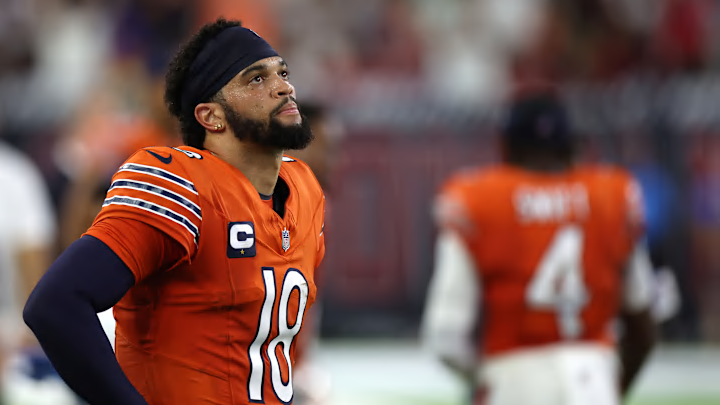The Chicago Bears have problems — and plenty of them.
Entering the 2024 season, expectations were high for Caleb Williams, the rookie quarterback who became the first No. 1 overall pick in franchise history.
Williams was touted as a generational prospect during his collegiate career, and he was expected to immediately change the fortunes of the quarterback-starved franchise. Chicago stockpiled offensive weaponry during the offseason to surround Williams with a talented supporting cast.
While the allure of Williams zipping passes to D.J. Moore, Keenan Allen, and Rome Odunze was captivating, the Bears seemingly forgot the cautionary tale told by teams of yesteryear: Championships are won by building a team, not by collecting talent.
Finding schematic fits and leadership is often more important than chasing talent. Drafting an offensive lineman could prove to be more vital than a rookie wide receiver selected with the No. 9 overall pick.
These are basic principles of roster-building, but the Bears didn’t seem to follow any of them. Now there’s a lot of finger-pointing happening in Chicago once again. This year, it only took two weeks.
D.J. Moore didn’t look too happy to play with Caleb Williams
Chicago suffered a 19-13 loss to the Houston Texans on Sunday night, and it was an ugly game for the offense. Williams completed 23 of 37 pass attempts for just 174 passing yards with two interceptions and a 51.0 quarterback rating.
As Williams struggled, his receiver pouted.
D.J. Moore was not having it all last night. All moments I caught combined.pic.twitter.com/mcId7tBDtu
— ✶ Ⓜ️𝕒𝕣𝕔𝕦𝕤 ▶️ ✶ (@_MarcusD3_) September 16, 2024
D.J. Moore appeared frustrated throughout the game as Williams continuously struggled to find him on routine plays. Through two games, Moore is currently on pace for a career-low 44.5 yards per game and 8.1 yards per reception. He has yet to score a touchdown and has caught just 11 receptions for 89 yards through the first two games of the season.
Odunze has 44 receiving yards, second-most on the team, but he has only managed to record three receptions in his first two career games. Allen missed Week 2, but he could only manage to catch four of his 11 targets for 29 yards in Week 1.
So far, the results are a far cry from what was expected from the revamped offense. The Bears have scored just one offensive touchdown — a two-yard run by Khalil Herbert — but they’ve managed to record five turnovers, three of which were from Williams.
As is tradition in Chicago, Bears fans were quick to blame the offensive line. Williams was pressured on 23 of his 48 dropbacks, according to NFL Next Gen Stats. The Texans had 36 total individual pressures by 10 different pass rushers, although some were on the same play.
Williams was sacked seven times and took 11 quarterback hits during the game.
While it’s easy to blame the offensive line, pass protection is not solely on the offensive line — it comes down to everybody involved in the operation. Play calling, cadence, blitz recognition, decision-making and route-running all play integral roles in avoiding disaster.
There’s plenty of blame to go around. The front office placed too much emphasis on acquiring skill position players. The play-calling was questionable at best. Coaching can be scrutinized for pre-snap penalties that put the offense in disadvantageous situations. Williams has to make better decisions and make them quicker.
